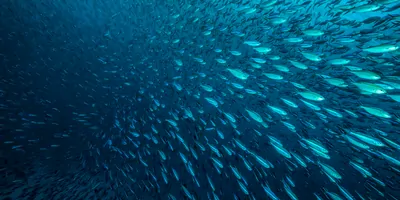ITHACA, NY — Fish can adjust their sensitivity to the actions of others—such as fleeing due to a false alarm—to reduce the risk of responding to misinformation, according to a new study. Other animals, including humans, may also have these decision-making mechanisms.
When wild coral reef fish swim alone or in small groups, they are highly attuned to the actions of others. For example, when fish around them startle, they’re more likely to flee themselves. But in large, dense schools, where fish around them are more likely to startle or dart for no reason, individuals are more willing to take risks and tune down their sensitivity to social cues, making them less likely to flee when a neighboring fish does.
The behavior doesn’t necessarily discriminate between true threats and misinformation, rather, it adjusts sensitivity in a way that will lower the probability of responding to a false alarm.
Analysis of footage from underwater camera observatories found that individuals in schools of wild foraging fish flee for shelter even when no predator or threat is present about once every eight minutes.
For the study, published in the Proceedings of the National Academy of Sciences, researchers used new computer vision tools, machine learning, and computational modeling to analyze foraging coral reef fish in Mo’orea, French Polynesia.
“When we looked at the features of the model that matched observed behavior, we found that it adjusts the sensitivity of individuals to signals produced by others, based on the past history of what they’ve been seeing,” said senior author Andrew Hein, assistant professor of computational biology at Cornell University.
When there is a lot of visual motion, individuals appear to lower their sensitivity to it, and when there is very little visual motion, they increase their sensitivity, Hein said. “So, they seem to be dynamically adjusting the sensitivity,” he added.
In the study, the researchers used coral reef fish as a model system. The fish feed in dangerous areas where there are predators, prompting them to be edgy and skittish, even when predators are not present. Using computer vision technology to analyze footage of the fish from underwater observatories in coral reefs, the researchers precisely tracked the actions of every individual in a frame and reconstructed what each individual saw and the decisions they made.
“Mechanisms for adjusting sensitivity are actually crucial if you’re going to maintain control over your behavior,” Hein said. The new model was based on well-studied properties of fish neural circuits that control these behaviors.
While more study is needed, the paper suggests that the need to cope with misinformation may have driven the evolution of how brains process information, Hein said.
“Because of its simplicity, and the ease with which it can be implemented in the nervous system, we believe this form of dynamic control of sensitivity may be widespread in biological systems and may have evolved as a simple but robust way of coping with misinformation,” he said.
- This press release was originally published on the Cornell University website













